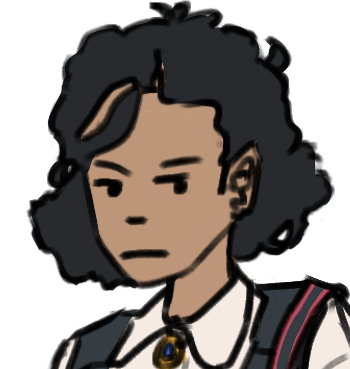NEW Story: Cocktail
The Valley of Faith and Sorrow

This article is not part of Vekllei canon. It may be old, obsolete or just a bit of fun.
On her days off from her place of work in the village library, Zelda would descend the slope of the village into a great basin of creeks and flower-tundra. In the summer, when it was warm enough to sit in the sun, you could sit at one end of the valley and admire the wind rushing to meet you as it whipped through fields of flowers. For a few moments you could admire yourself for what you were — a small being in a landscape as old as the Earth. It put certain things in perspective. Some people needed to go out and look for a place that would finally make everything make sense. But, Zelda thought, sometimes you could reach the corners of the Earth and still stay where you are.
There is no greater struggle in a Vekllei person’s life than that with themselves. Work, like recreation and indeed like consumption itself, is social in this country. Most ordinary material whims of a person can be satisfied in a matter of hours, depending on the nearest station’s timetable. A handful of dreams are also accessible — a trip to the moon, for instance, is a matter of writing the Moon Office and waiting to receive tickets.
Without money, there is not much by way of commodity. And without commodity, the premises of life and identity have to be interrogated. A cultural intuition that hasn’t been seen in developed countries since before the industrial revolution has reawakened, and with it come uneasy existential questions.
What are we doing here, on this planet? What am I doing here? How do I come to terms with the fact that everything is either moving away from or moving towards nothingness?
Where the pit of material desire sits in other nationalities, the Vekllei person has a great deal of social anxiety. This phenomenon has only become more severe now that recovery from the Great Atomic War is nearly complete and Vekllei’s security in the world is mostly assured. Life for most people now engages with their immediate surrounds — family, community, and love.
While any combinations of these things can actualise a person, and even rehabilitate the directionless, it doesn’t work out like that for everyone. Family bonds often sever; communities can be transitory; love is elusive. Even with these things, the question of purpose is more pertinent than ever before, as the whole world approaches a reality without human labour. Just what is it that makes life worth living?
This explains, in part, why Vekllei people may not be much happier for all their enormous collective wealth. Despite the richness of their culture, optimism for their future and satisfaction with their conditions, none of these things properly emancipate the heart of utopia from its existential question — is it possible to automate humanity right out of humans?
When Vekllei people meet that golden horizon, and cross that rubicon, what waits for human intuition on the other side? Will it be endless days of poolsides and dinner parties? Or will it destroy the soul of our animalistic origins — leaving us desperate for value as useful people, and our purpose in work? Whatever the case may be, Vekllei is rapidly approaching it.
